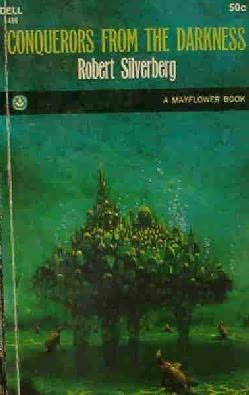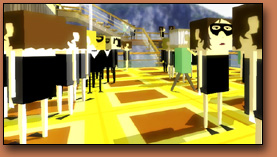Blog
Short Fiction Life-Extension
“Childrun” has been selected for Hartwell & Cramer’s Year’s Best Fantasy 9, which this time around will be an electronic book with a POD component. An interesting experiment.
What I Will Do On My Summer Vacation
Here’s the line-up, from Mike Brotherton’s website.
BOOKS OUR PARENTS GAVE US (or Forbade)
[This was written a few months ago…just came across it and realized I’d never posted it.]
I just gave my oldest daughter a copy of Carrie. I guess I want her to connect to a strong stream of pop horror; I’m curious whether the book can still grip a modern teenage reader more recently under the thrall of Stephanie Meyers. Whether she’ll read it or not, I don’t know. We’ll see. This reminded me of the influence of parental reading and recommendations on my own development as a reader…and a writer.
What really spurred this line of thought is the fact that I’m finally reading Deliverance. I saw the movie, of course—and I saw it in the theater when it first came out. But I already had strong impressions of the movie before I saw it, and they were received not from Hollywood, not from the previews, not from kids at school talking about the film—but from my mother. When the book came out in 1970, it was a best seller. My mother read it sometime in the early 70s, and I still her excitement as she tried to convey the scene in which the narrator of the story climbs a sheer rock face. I got such a vivid impression of that scene—the intensity of description, the fact that this terrifying climb stood for something deeper than the action itself–that nothing in the movie could rival it. In fact, I’m a bit wary of getting to that point in the novel, because I’m afraid it will never compare to what I’ve imagined it to be for nearly 40 years now. All the urgency came from my mother’s exhilarated attempt to describe what in the writing had excited her…and that scene I’ve never read has stayed with me and lurked as a significant force in my picture of what writing can mean, what it can do and convey to a reader, ever since. I’m reading Deliverance, but I’m not there yet. Soon I’ll know if this long-held memory will dissipate, if the influence of the unread Deliverance will end up paling by comparison to the actual Deliverance. But for now I’m in a state of suspense between the imagined narrative and the real one. It’s an interesting place.
My parents’ reading had a strong influence on my own reading. I’m curious about the experience of others in this regard. I think a lot of readers might find the taboo books to have been the most influential: Were there books your parents forbid you to read, that you sneakily devoured in secrecy? Were these more powerful reading experiences because of the taboo, or were you disappointed? My mother only ever prevented me from reading one book: The Exorcist. I had read a few chapters (again, in the early 70’s, at the height of Exorcist excitement—as the book was a huge bestseller and the movie was everyone’s obsession, impossible for a horror-oriented kid like myself to ignore) when she noticed me reading it. She had read it already and apparently something in there triggered her feeling for the first (and only) time that she should impose limits. I had already reached a description of a sexually violated Virgin Mary, without quite understanding what I was reading; and when I finally read the book much later, as an adult, the parts I found most interesting were the scenes of Father Karras’s research in the Catholic library (a purely literary passage that, unsurprisingly) never made it into the movie. But far more important than the book(s) she banned were the ones she read and tried to relate.
When I was very young, she read Lord of the Rings, and occasionally she would read passages to my brother and I while we were heading off to sleep. I’ll never forget The Mines of Moria, starting at the gate and the attack by the lurker in the waters, ending with the escape into light—though I scarcely knew who Gandalf was at the time. Then she read of Merry and Pippin’s time with Treebeard. I had no idea that these stories were taken from LOTR. When I read the books myself a few years later, there was a shock of discovery and disorientation as I realized that the scenes I was reading were the same ones I had heard…
More influential was The Martian Chronicles, as it served as my first impression of science fiction. I remember my mother telling me of a book she was reading, where the characters stroked the pages of a book and it spoke its stories to them. This was “Ylla.” I begged her to read me the whole story, and then lay claim to the copy of The Martian Chronicles she was reading—a Times edition trade paperback that eventually Ray Bradbury himself signed, and which I still treasure.
The other powerful literary influence in our house was the biggest bookcase itself—holding mainly the strange books my father had acquired, both from childhood (himself a bookish boy, I suspect) and in the course of required college reading. Some of these I fetishized: There was a book about biology, which included photographs of medical horrors as well as drawings of enormous carnivorous plants; another which taught introductory astronomy under a thick veil of fiction, following the spaceship journey of several kids through the solar system. I will never forget an illustration of the sweltering pilot pulling back hard on the handbrake to prevent the ship from plunging into the sun! But then there were the unillustrated books whose titles alone fascinated me: The Magic Mountain, which became crosswired in my mind with both The Big Rock Candy Mountain and the mountain that opened up to swallow the children who followed the Pied Piper. When I finally read The Magic Mountain, at around age 20, it was a strange and significant experience partly because this was a book I had studied from afar for many years before finally approaching.
My father never prevented me from reading a book, although unlike my mother, he did not quite appreciate my childish tastes, and rarely recommended anything that appealed to me immediately—with one exception. He bought me odd books for gifts—things with titles like Miscellany. Exercises in short fiction that lacked the weird or horrific angle that was all important to me. Later he gave me collections by Updike and Welty when I was old enough to appreciate them. But the one major influence he had on my childhood reading was Poe—both literary enough to satisfy his academic leanings, and lurid enough to appeal to me. My brother and I cowered under our covers on the nights he put us to sleep with “The Telltale Heart,” “The Black Cat,” “The Pit and the Pendulum.” These few nights of reading warped my imagination permanently. I took to writing Poe-esque tales, always featuring bloody daggers and vengeful spirits and hotels with haunted Room 13’s. (The dagger itself was a direct steal from another of my father’s books—a huge complete works of Shakespeare, whose frontispiece was a scene from Macbeth, with a horrified Macbeth contemplating a dagger floating eerily in mid-air darkness.)
Finally, there was one book on which my parents had an equal influence. I don’t remember who started it first, but at some point in the late 60’s, they began reading Catch-22 together. I remember them talking about it, reading their favorite passages to each other, howling with laughter. When I read the book myself, in junior high school, I continually tripped across passages they had read out loud: The one that stands out, blurred by years but still partially intact, involved the painting of a patient’s toes with mercurochrome or merthiolate. I don’t remember why it was funny, but I remember them laughing together, sharing the book with each other. And in an unintentional way, sharing it with me.
How about you? Feel free to share stories in the comments.
Silverberg-Induced Trauma, Early and Mid-
My Mom must have read a lot of SF when I was little, because along with reading me passages from The Martian Chronicles, I remember her telling me the plot of this Silverberg novel, Conquerors from the Darkness, and then reading a scene where somebody chokes to death on a fishbone. It gave me a very intense fear of choking to death on fishbones. My Mom already had trouble getting me to eat fish, so from a child-rearing point of view, exposing me to this passage probably wasn’t the best idea. Still, it was a cool book.

Not much later, I encountered Silverberg’s excitingly horrific Planet of Death, and for a while after reading it, every story I wrote included a part where somebody died in a pit of acid or was lashed to a bloody pulp by savage tentacles.

When I finally met Silverberg and told him how much I had loved this book as a kid, he raised one eyebrow in a look of practiced irony and said, “I wrote that book for slow readers.”
Lovecraft Unbound
Great news. Ellen Datlow just announced that M Press will be putting out her Lovecraft Unbound collection in October of 2009 instead of 2010 as initially planned. These were to be stories under the influence of Lovecraft, but without overt references–i.e., no tentacles.
Here is the table of contents:
“Houses Under the Sea,” Caitlin R. Kiernan (reprint)
“The Din of Celestial Birds,” Brian Evenson (reprint)
“In the Black Mill,” Michael Chabon (reprint)
“Commencement,” Joyce Carol Oates
“One Day, Soon,” Lavie Tidhar
“Catch Hell,” Laird Barron
“Machines of Concrete Light and Dark,” Michael Cisco
“Leng,” Marc Laidlaw
“Sight Unseen,” Joel Lane
“Vernon, Driving,” Simon Kurt Unsworth
“Marya Nox,” Gemma Files
“That of Which We Speak When We Speak of the Unspeakable,” Nick Mamatas
“Sincerely, Petrified,” Anna Tambour
“The Tenderness of Jackals,” Amanda Downum
“The Office of Doom,” Richard Bowes
“Mongoose,” Sarah Monette & Elizabeth Bear
“Cold Water Survival,” Holly Phillips
“The Recruiter,” Michael Shea
“The Crevasse,” Dale Bailey and Nathan Ballingrud
“Come Lurk with Me and Be My Love,” William Browning Spencer
Tigger Fun
Clute Joins SciFi Wire, Hilarity Ensues
John Clute is doing his thing once again, in a venue that is really, really, really not ready for him.
Gravity Bone

Do yourself, and all of us, the whole game industry, a favor. Play Gravity Bone. This is why we’re here. Don’t read about it, although you will see links to plenty of people talking about why it is wonderful. Play it first. It’s short and sweet, and will pay you back handsomely for a minimal investment of your time. (Oh: Quicksave is F6, and at one point you may want it.)
Update: Here’s a good Tom Chick interview with the game’s creator.
Quickstone Coming; F&SF Goes Bimonthly
In the latest issue of The Magazine of Fantasy & Science Fiction, there’s a mention that my next Gorlen Vizenfirthe story, “Quickstone,” will appear in the March issue. I’m not sure that gives you enough time to subscribe, but you should do it anyway. Meanwhile, buried in the forum, Gordon Van Gelder announces that F&SF will be going to a bimonthly schedule after the March issue. Double-sized issues, half as often. I hope this helps them survive to the next millennium.

